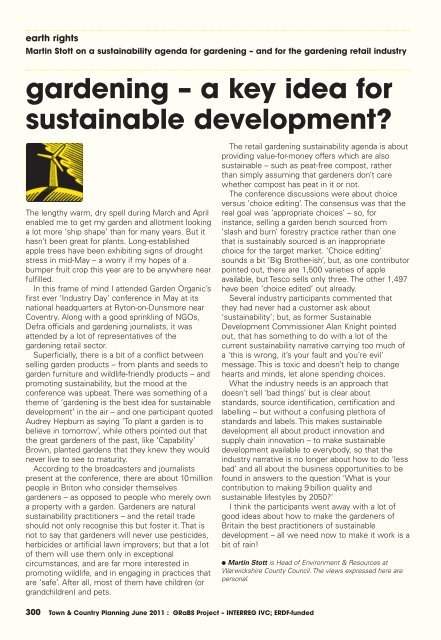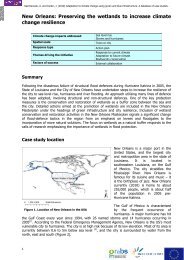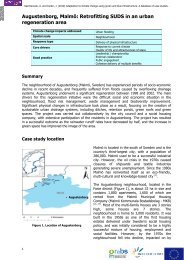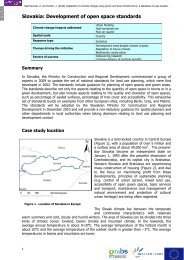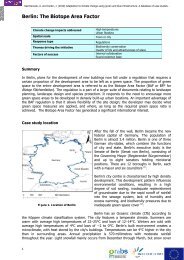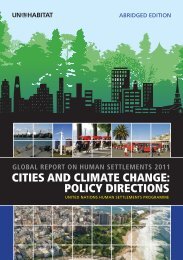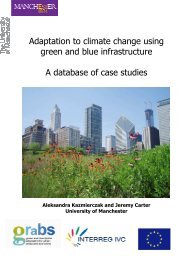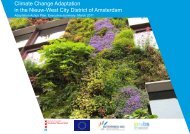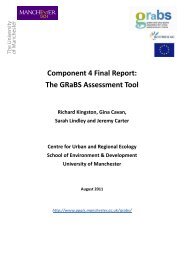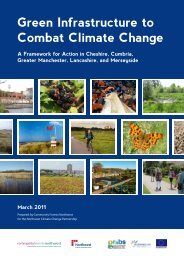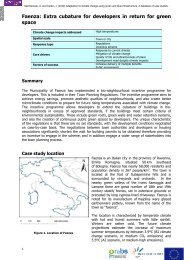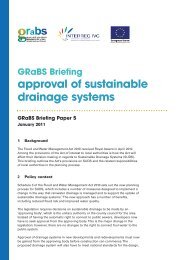Download - GRaBS
Download - GRaBS
Download - GRaBS
Create successful ePaper yourself
Turn your PDF publications into a flip-book with our unique Google optimized e-Paper software.
earth rights<br />
Martin Stott on a sustainability agenda for gardening – and for the gardening retail industry<br />
gardening – a key idea for<br />
sustainable development?<br />
The lengthy warm, dry spell during March and April<br />
enabled me to get my garden and allotment looking<br />
a lot more ‘ship shape’ than for many years. But it<br />
hasn’t been great for plants. Long-established<br />
apple trees have been exhibiting signs of drought<br />
stress in mid-May – a worry if my hopes of a<br />
bumper fruit crop this year are to be anywhere near<br />
fulfilled.<br />
In this frame of mind I attended Garden Organic’s<br />
first ever ‘Industry Day’ conference in May at its<br />
national headquarters at Ryton-on-Dunsmore near<br />
Coventry. Along with a good sprinkling of NGOs,<br />
Defra officials and gardening journalists, it was<br />
attended by a lot of representatives of the<br />
gardening retail sector.<br />
Superficially, there is a bit of a conflict between<br />
selling garden products – from plants and seeds to<br />
garden furniture and wildlife-friendly products – and<br />
promoting sustainability, but the mood at the<br />
conference was upbeat. There was something of a<br />
theme of ‘gardening is the best idea for sustainable<br />
development’ in the air – and one participant quoted<br />
Audrey Hepburn as saying ‘To plant a garden is to<br />
believe in tomorrow’, while others pointed out that<br />
the great gardeners of the past, like ‘Capability’<br />
Brown, planted gardens that they knew they would<br />
never live to see to maturity.<br />
According to the broadcasters and journalists<br />
present at the conference, there are about 10million<br />
people in Briton who consider themselves<br />
gardeners – as opposed to people who merely own<br />
a property with a garden. Gardeners are natural<br />
sustainability practitioners – and the retail trade<br />
should not only recognise this but foster it. That is<br />
not to say that gardeners will never use pesticides,<br />
herbicides or artificial lawn improvers; but that a lot<br />
of them will use them only in exceptional<br />
circumstances, and are far more interested in<br />
promoting wildlife, and in engaging in practices that<br />
are ‘safe’. After all, most of them have children (or<br />
grandchildren) and pets.<br />
The retail gardening sustainability agenda is about<br />
providing value-for-money offers which are also<br />
sustainable – such as peat-free compost, rather<br />
than simply assuming that gardeners don’t care<br />
whether compost has peat in it or not.<br />
The conference discussions were about choice<br />
versus ‘choice editing’. The consensus was that the<br />
real goal was ‘appropriate choices’ – so, for<br />
instance, selling a garden bench sourced from<br />
‘slash and burn’ forestry practice rather than one<br />
that is sustainably sourced is an inappropriate<br />
choice for the target market. ‘Choice editing’<br />
sounds a bit ‘Big Brother-ish’, but, as one contributor<br />
pointed out, there are 1,500 varieties of apple<br />
available, but Tesco sells only three. The other 1,497<br />
have been ‘choice edited’ out already.<br />
Several industry participants commented that<br />
they had never had a customer ask about<br />
‘sustainability’; but, as former Sustainable<br />
Development Commissioner Alan Knight pointed<br />
out, that has something to do with a lot of the<br />
current sustainability narrative carrying too much of<br />
a ‘this is wrong, it’s your fault and you’re evil’<br />
message. This is toxic and doesn’t help to change<br />
hearts and minds, let alone spending choices.<br />
What the industry needs is an approach that<br />
doesn’t sell ‘bad things’ but is clear about<br />
standards, source identification, certification and<br />
labelling – but without a confusing plethora of<br />
standards and labels. This makes sustainable<br />
development all about product innovation and<br />
supply chain innovation – to make sustainable<br />
development available to everybody, so that the<br />
industry narrative is no longer about how to do ‘less<br />
bad’ and all about the business opportunities to be<br />
found in answers to the question ‘What is your<br />
contribution to making 9 billion quality and<br />
sustainable lifestyles by 2050?’<br />
I think the participants went away with a lot of<br />
good ideas about how to make the gardeners of<br />
Britain the best practitioners of sustainable<br />
development – all we need now to make it work is a<br />
bit of rain!<br />
● Martin Stott is Head of Environment & Resources at<br />
Warwickshire County Council. The views expressed here are<br />
personal.<br />
300 Town & Country Planning June 2011 : <strong>GRaBS</strong> Project – INTERREG IVC; ERDF-funded


